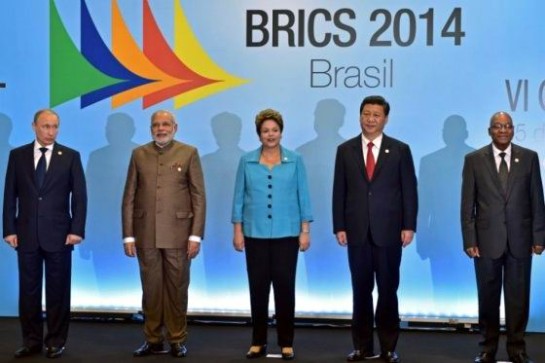
Russia Proposes an “Energy Association” with BRICS members
Of late, the U.S. focus on Russia has solely been on its role in the conflict with Ukraine. While this is a large issue that certainly warrant coverage, Russia has taken the opportunity to continue expanding its sphere of influence. Sensing the iron curtain descending in Europe, Russia is seeking ways to continue use its energy resources.
There are reports that Russia is planning on forming an energy association with major developing countries. Using the latest BRICS (Brazil, Russia, India, China, South Africa) diplomatic meeting in Brazil to outline their proposal, Russia wants to create a fuel reserve bank and a corresponding energy policy institute. In his speech, Putin declared that this move would help create new instruments and institutions to strengthen energy security for all the countries involved. The energy policy institute will likely help drive research about the global market for hydrocarbons that allow the implementation of sound policies.
BRICS countries represent the fastest growing markets in the world. These five countries alone house 40 percent of the world’s population in addition to having its combined gross domestic product (GDP) grow by over 300 percent in the last decade. Russia’s latest proposal is likely to be an effort to calibrate the supply and demand of energy resources. Russia and Brazil will play an increasing role in the world’s energy production, and it can use the BRIC framework to make agreements with China and India, two countries with the largest populations with large energy needs.
But energy dealings have already taken place between Russia and other BRICS members. Already, Russia has cooperated with many South American and Asian countries to expand its influence by using energy security as a goal that all countries can agree on. Recently, Putin signed a 30-year, $400 billion agreement with China to pipe natural gas from Russia to satisfy China’s growing demands for energy. In India, Russia is negotiating a deal to create a pipeline. In South America, Russia’s Rosatom, the state-owned nuclear company, has signed deals with Argentina and Brazil to construct power plants and other facilities.
The hope is that Russia can align itself early with these emerging nations and carve its own alliances while reducing its dependence on Europe. The creation of the new BRICS bank is a reaction to what member countries consider unfair lending policies by the Western world through the International Monetary Fund (IMF) and the World Bank. The success of BRICS may aid in reducing the influence of the United States and other Western institutions among many parts of the world. There has been discussion of exporting natural gas from the United States, but progress has been extremely slow on that front. It may be necessary to expedite the process and start approving liquid natural gas (LNG) export facilities so that it can counter Russia’s energy diplomacy.
This post is by ASP Adjunct Junior Fellow Farhad Mirzadeh.






[…] Russia Proposes an “Energy Association” with BRICS Members […]